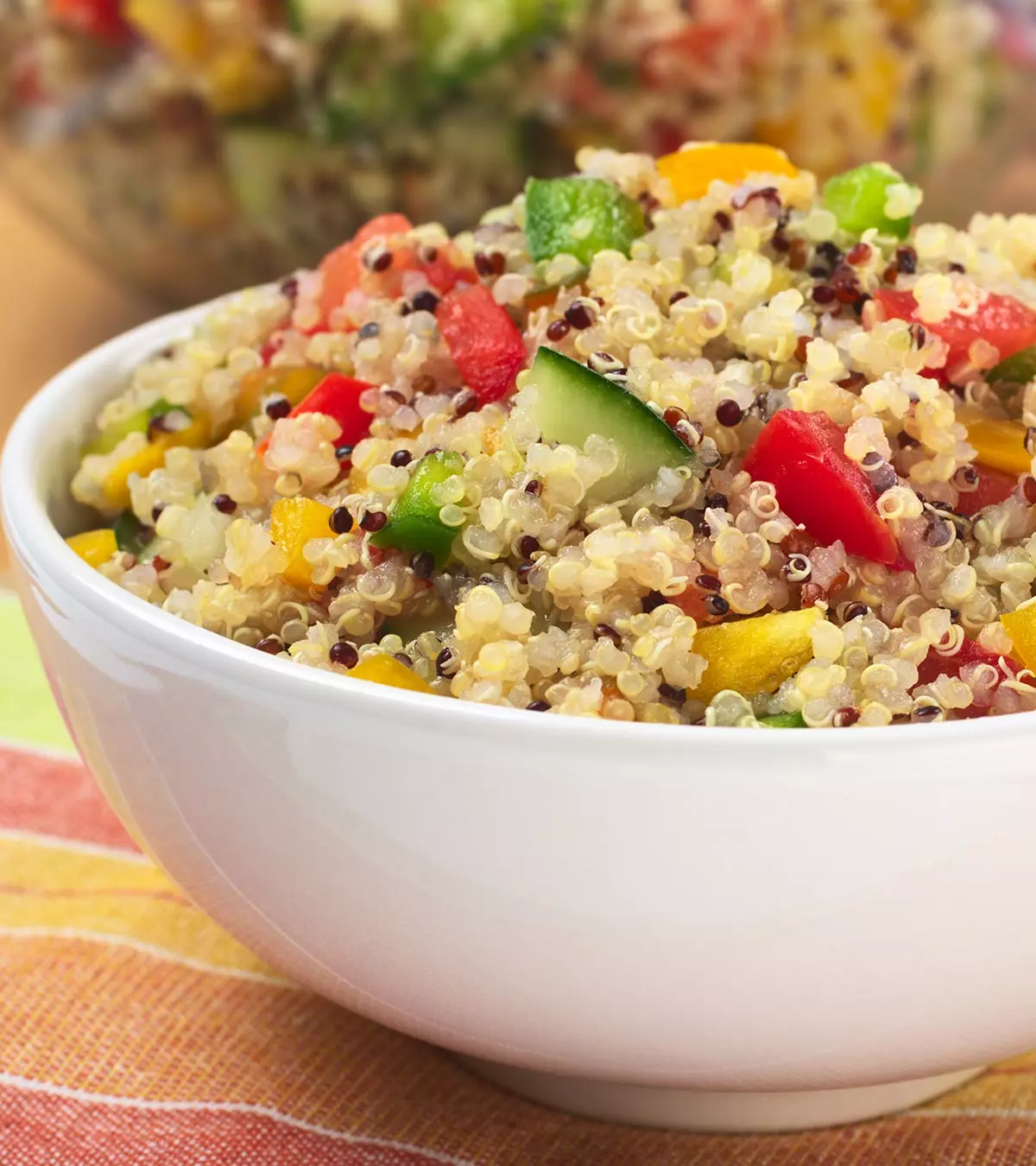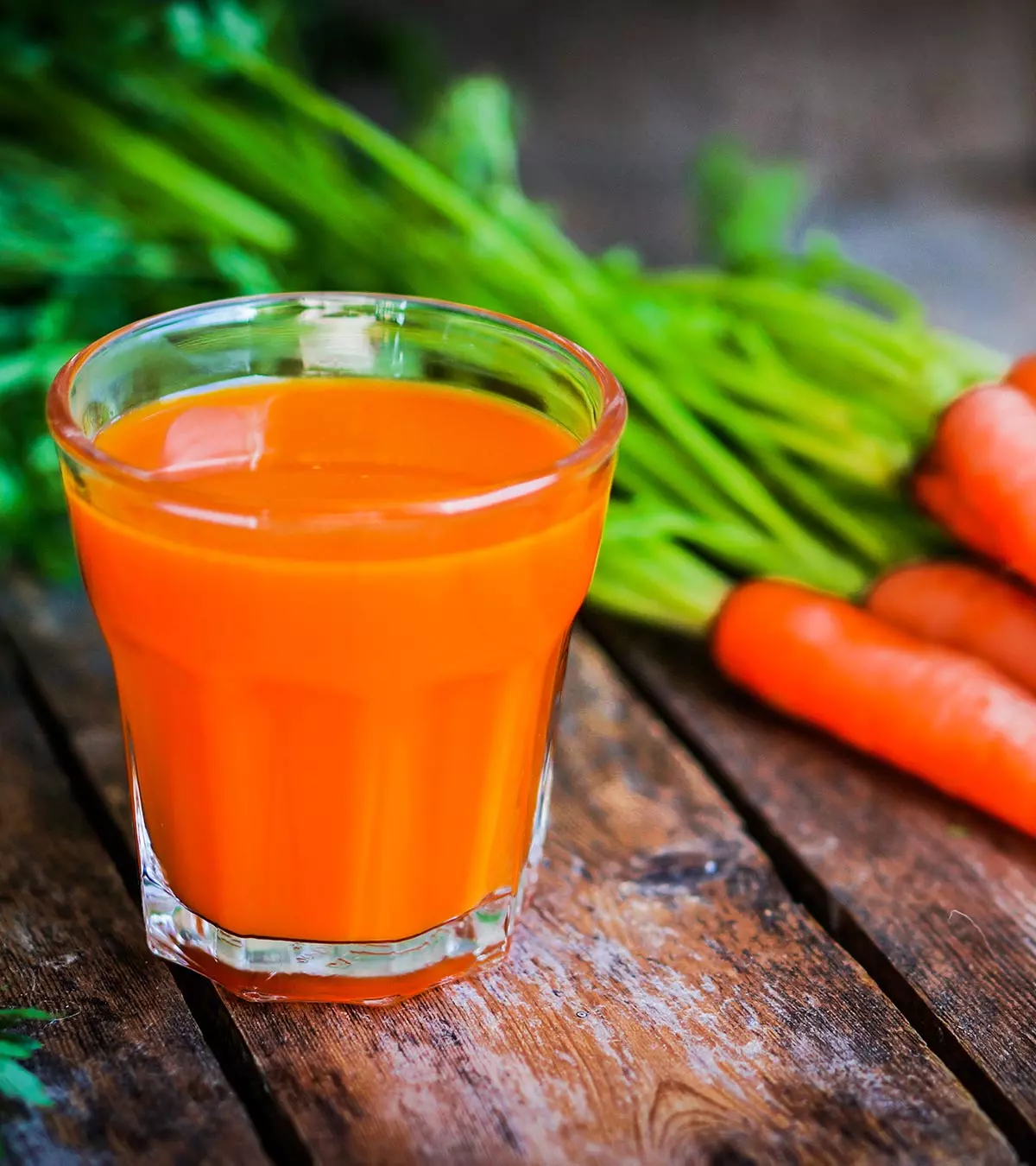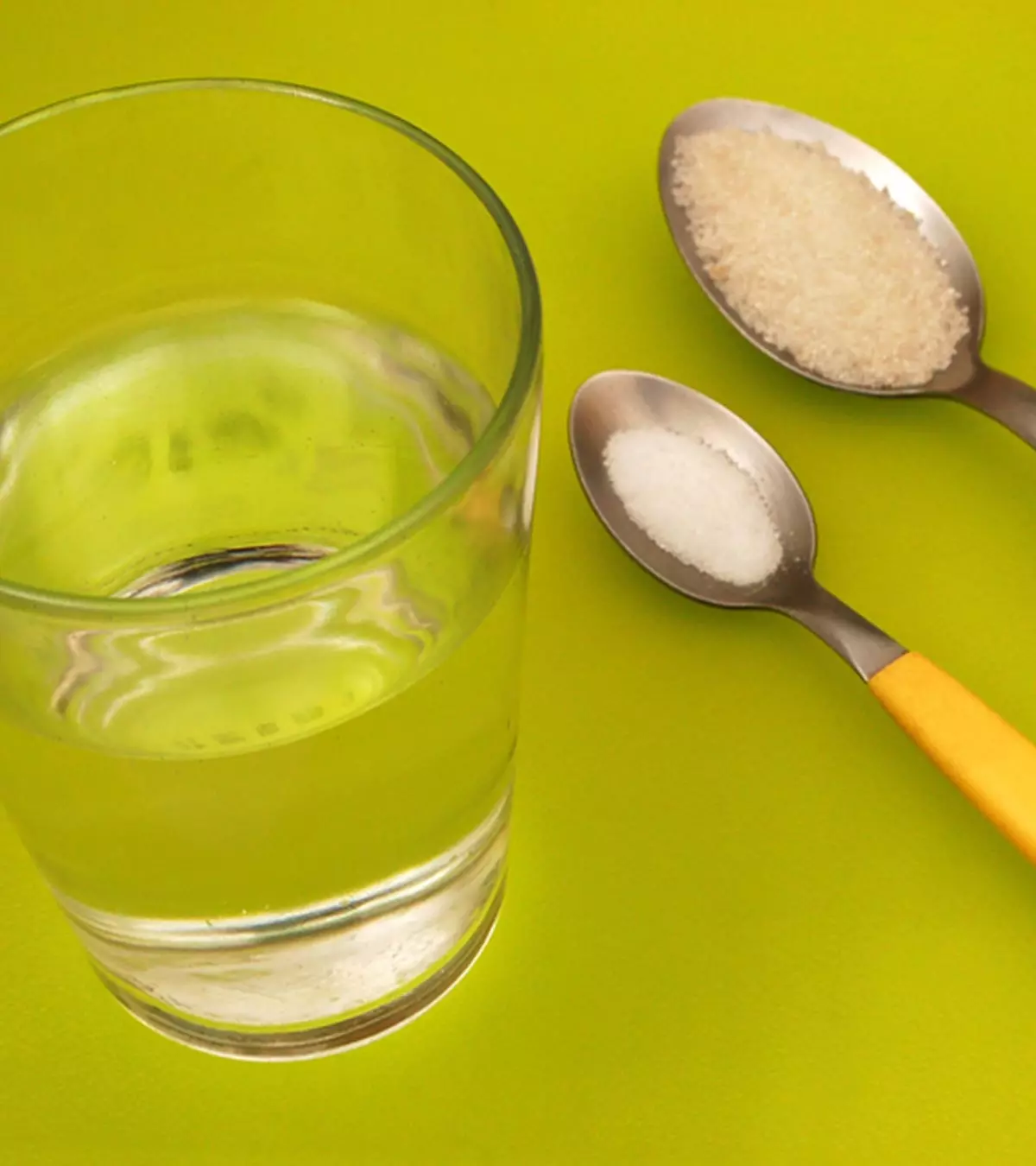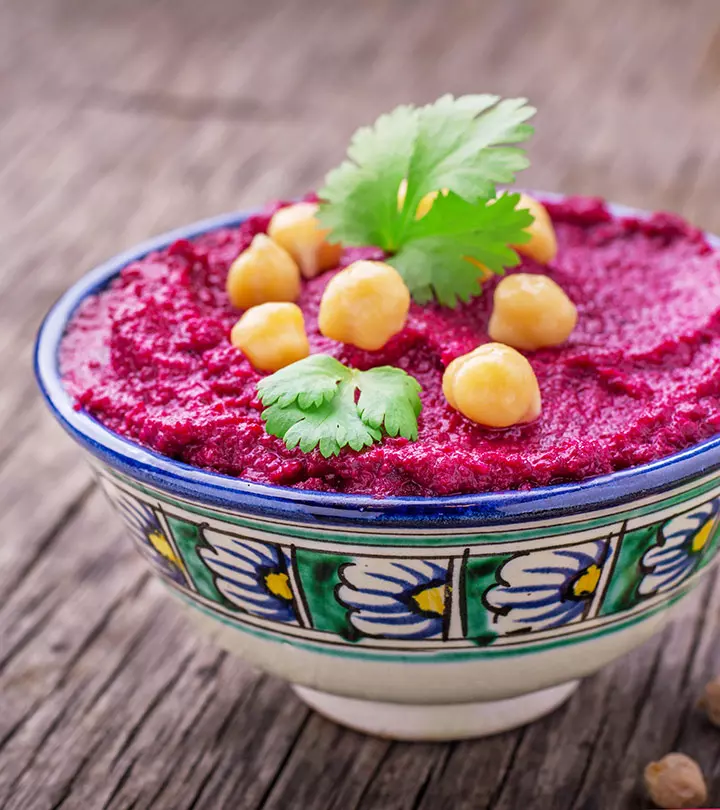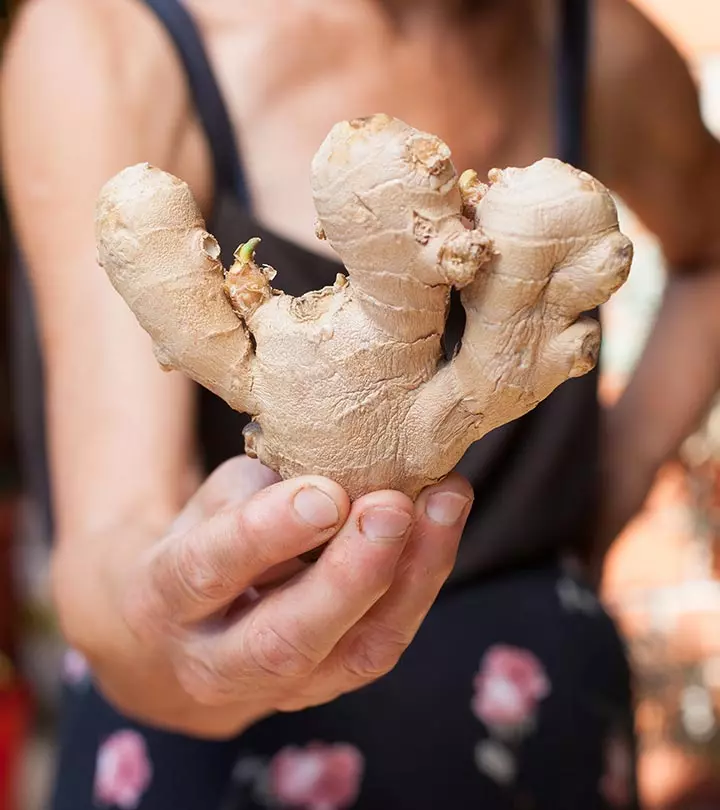
Image: Shutterstock
Ginger has been used as a therapeutic agent to cure illnesses and control pregnancy symptoms such as nausea or morning sickness. But is it safe to include this medicinal plant in the pregnancy diet, and how much of it can be consumed? Ginger is considered to be one of the superfoodsiA term used for foods that are high in nutrients and offer various health benefits . For pregnant women, it helps manage symptoms of vomiting, cramps, back pain, etc. Studies have suggested that consuming about one gram of fresh ginger per day can aid in fetal development. Continue reading this post to learn about the benefits of ginger and how you can eat it.
Key Pointers
- Ginger is safe in moderation in food during pregnancy, but not dried root.
- Ginger has health benefits such as improving blood circulation, alleviating morning sickness and nausea, lowering cholesterol levels, treating colds and coughs, and maintaining blood sugar levels.
- Women who have had a miscarriage, gestational diabetes, vaginal bleeding, or taking blood pressure or clot medication should avoid ginger.
- Excessive ginger use can lead to miscarriage or menstrual bleeding.
- To minimize unwanted side effects, restrict ginger intake and consult a doctor if taking medication.
Is It Safe To Eat Ginger During Pregnancy?
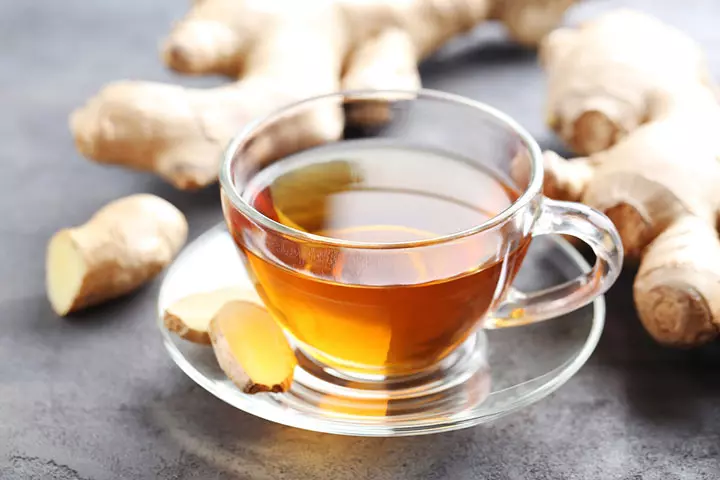
Image: IStock
Yes, it is safe to take fresh ginger in your food during pregnancy (1). However, dried root may not be good. Ginger is beneficial for maternal health as long as it is taken in healthy amounts, by adding it to a recipe or ginger tea. Do not take any ginger supplements unless you get your doctor’s opinion, as the higher concentrations may raise the risk of miscarriage.
How Much Ginger Is Safe During Pregnancy?
You can take about one gram of ginger root per day in two to four divided doses. You can include fresh ginger or candied forms for pregnancy-related nausea and morning sickness (2). You need to be especially careful in the first trimester.
During the first trimester, you are likely to suffer from nausea, vomiting, malaiseiA feeling of being unwell and mood changes. So, the best time to drink ginger tea during pregnancy is when you feel nauseated; it alleviates your discomfort and is refreshing. But, do not over-consume this herbal remedy just because it is working for you.
10 Possible Benefits Of Eating Ginger During Pregnancy
You may be sipping a hot cup of ginger tea or adding ginger in your food for its flavor. Here are some of the possible benefits that ginger might have for you.
1. Blood circulation
Ginger boosts blood circulation in your body and therefore promotes adequate blood supply to your unborn baby.
2. Cholesterol levels
Ginger helps control cholesterol levels, thus it could help reduce the risk of high cholesterol levels during pregnancy. The total cholesterol levels increase by about 25-50% during pregnancy, as stated by the American College of Cardiology (ACC).
3. Morning sickness

Image: Shutterstock
If you are suffering from morning sickness and nausea, you can expect relief by taking ginger as it is a soothing agent. Have homemade ginger ale or ginger tea to calm down those tummy issues.
 Research finds
Research findsBlanca Garcia, a registered dietitian nutritionist from Los Angeles, California, says, “Ginger tea is the best-known non-pharmacological treatment for managing morning sickness. It’s sweet and slightly spicy, has a soothing concentrated flavor, and a refreshing aroma that gives a comforting kick.”
“Gingerols, the major pungent compounds in ginger, are responsible for their anti-nausea effect. When ingested in a fasting state or after food intake, it causes an increase in gastro-duodenal motilityiThe contraction and movement of the muscles in the stomach and duodenum that assist in moving food through the digestive tract . Thus, resulting in a reduction in nausea and vomiting.”
4. Cold and cough
Ginger is effective in treating a common cold, minor ailments and persistent cough
. Your immune system gets sluggish when you are pregnant, making you vulnerable to these minor ailments. Ginger can boost immunity and help you recover. Its antioxidant properties also help in preventing these diseases (3).
Ginger tea is popularly used to get relief from cough, sore throats, and chest congestion. To make this tea, add crushed fresh ginger in a cup of water and bring to a boil. For flavor enhancement, you can also add lemon juice and honey. Ginger, when combined with lemon, is believed to create a potent defense system against sore throats (4). Additionally, you can also try adding mint leaves and cinnamon to the boiling mixture for added flavor and benefits. Drinking this concoction three to four times a day is believed to be beneficial (5). However, it is recommended to consult with your doctor first and then start this home remedy.
5. Blood sugar levels
Research studies state that ginger might help keep the blood glucose levels in check. It also aids in maintaining your energy levels high and controlling exhaustion and fatigue (6).
6. Heartburn
Ginger helps deal with heartburniA burning and painful sensation that develops in the chest when stomach acid returns to the food pipe (esophagus) . You can consume ginger tea made with a fresh slice of ginger and sugar or honey to sip in between your meals. Herbal remedies such as homemade ginger ale also work.
7. Bloating
During pregnancy, the digestive system slows its processes to allow the baby to absorb nutrients
. This might make you feel heavy, leading to bloating and gas. Take ginger before bedtime to avoid any digestive issues. You can also take one teaspoon of fresh ginger juice and honey.
8. Inflammation
Ginger is anti-inflammatory in nature and thereby reduces inflammation and swelling during pregnancy. Dip a slice of ginger in honey and eat it for relief.
9. Tired muscles

Image: Shutterstock
A cup of ginger tea a day might relieve you from achy bones and muscles, which usually result from back pain, sciaticaiPain that travels along the sciatic nerve, running from the lower back to the hips and buttocks and then to legs , or sore feet (7).
10. Libido
Ginger improves your libido. It warms up the body, and improves the functioning of the circulatory system, particularly towards the genitals.
Are There Any Side Effects Of Ginger In Pregnancy?

Image: IStock
Consuming fresh ginger in small amounts may not cause any problems. However, you may have to take some care:
- Talk to your doctor if you can take ginger when you are on medication for blood pressure or blood clots.
- Avoid ginger if you have a history of miscarriage, clotting disorderiA group of blood disorders where blood clots more often than it should , vaginal bleeding, and dizziness.
- Women with gestational diabetesiA type of diabetes that develops during pregnancy should also avoid ginger as it can affect blood sugar levels.
- Heavy doses of ginger can lead to miscarriage or menstrual bleeding, which may be dangerous for you and your unborn baby.
Limit the amount of ginger intake, maintain the food safety measures and use it the right way so as to get maximum benefits. But what could be the ‘right’ way?
Ways To Include Ginger In Pregnancy

Image: Shutterstock
Ginger is available in the form of candies, ale, capsules and chewable tablets. Keep them handy to manage those nausea strikes. If you are using ginger ale during pregnancy, read the ingredients list as some brands do not use ginger in it.
- Drink ginger infusion. Mix one teaspoon of ginger juice in one cup of hot water. Leave for five minutes and drink.
- Add minced ginger to over steamed vegetables or roasted potatoes.
- Mix shredded ginger in soups or stir-fries.
- Fresh ginger can give a twist to grilled fish such as trout or salmon
- As ginger has low sodium content, you can use in foods as a substitute for salt.
 Quick tip
Quick tipTo extend the shelf-life of ginger root, wrap it in a plastic bag and store in a freezer.
Frequently Asked Questions
1. Can ginger cause miscarriage in early pregnancy?
Ginger is not likely to result in miscarriage as long as you are taking it in small quantities.
2. Are ginger root capsules safe during pregnancy?
You should not take ginger root capsules without your doctor’s prescription. Your healthcare provider may recommend the capsule to decrease morning sickness (8).
3. Are ginger chews safe during pregnancy?
Ginger chews are made of real ginger root and contain all of its natural active compounds. They are soft, chewy and can also be used to make instant ginger tea. Eating half a candy can provide instant relief from nausea. Again, you should only buy them with your doctor’s prescription.
4. Are ginger snaps okay during pregnancy?
If you long to have a cookie from time to time during pregnancy, ginger snaps are a good option. They are low in fat and sugar and offer an abundant dose of vitamins and minerals. They would suit you best in the early months of pregnancy to work against morning sickness.
5. How much ginger is safe during pregnancy?
Olesya Wilson, a US-based certified nutritionist, says, “Many vitamin regimens will limit daily intake to a gram (1000mg) of ginger. There is no evidence that more will cause harm, but be aware if your prenatal already includes ginger powder. As with all things, listen to your body if consuming more or less does not feel good, and always consult a doctor if you have concerns.”
6. Can I take prenatal vitamins containing ginger?
Ginger is considered an effective agent for reducing nausea and vomiting in expecting women. Probably that’s one of the reasons that several over-the-counter (OTC) prenatal vitamins contain ginger. Speak to your healthcare provider if you are considering taking a prenatal vitamin, with ginger being one of its ingredients.
7. Does ginger consumption during the first trimester increase the risk of congenital abnormalities?
Studies show no link between prenatal ginger consumption and congenital abnormalities (9). Yet, pregnant women should consume ginger in moderation to avert adverse effects.
8. Does consuming ginger during pregnancy impact the unborn child’s behavior or learning ability?
No evidence suggests any association of ginger consumption during pregnancy with a child’s future behavior or learning issues (10).
Ginger is a highly nutritious and therapeutic ingredient to include in your pregnancy diet. So if you are wondering – is it safe to eat ginger during pregnancy? Go ahead and try out the different ways to include this refreshing superfood in your pregnancy meals to soak in its various benefits such as improved blood circulation, alleviation of morning sickness, management of heartburn, and more. However, be careful not to go overboard with it, as consuming more than the recommended amount can lead to complications.
Infographic: Possible Benefits Of Eating Ginger During Pregnancy
During pregnancy, ginger may offer several potential benefits. However, it is crucial to consult your doctor before consuming it or any other herbal supplement. They can help you determine if ginger is safe to consume and recommend the appropriate amount based on your needs and medical history. Check out the infographic below to learn more about the potential benefits. Illustration: Momjunction Design Team
Illustration: Unexpected Benefits Of Eating Ginger During Pregnancy

Image: Stable Diffusion/MomJunction Design Team
References
- Herbs and Pregnancy.
https://americanpregnancy.org/healthy-pregnancy/is-it-safe/herbs-and-pregnancy/ - Iñaki Lete and José Allué; (2016); The Effectiveness of Ginger in the Prevention of Nausea and Vomiting during Pregnancy and Chemotherapy.
https://www.ncbi.nlm.nih.gov/pmc/articles/PMC4818021/ - Nafiseh Shokri Mashhadi et al.; (2013); Anti-Oxidative and Anti-Inflammatory Effects of Ginger in Health and Physical Activity: Review of Current Evidence.
https://www.ncbi.nlm.nih.gov/pmc/articles/PMC3665023/ - Does lemon ginger tea work for a sore throat?
https://lifelineurgentcare.org/does-lemon-ginger-tea-work-for-a-sore-throat/ - Quieting That Cough, Naturally
https://jamaicahospital.org/newsletter/quieting-that-cough-naturally/ - Nafiseh Khandouzi et al.; (2015); The Effects of Ginger on Fasting Blood Sugar Hemoglobin A1c Apolipoprotein B Apolipoprotein A-I and Malondialdehyde in Type 2 Diabetic Patients.
https://www.ncbi.nlm.nih.gov/pmc/articles/PMC4277626/ - Parvin Rahnama et al.; (2012); Effect of Zingiber officinale R. rhizomes (ginger) on pain relief in primary dysmenorrhea: a placebo randomized trial.
https://pubmed.ncbi.nlm.nih.gov/22781186/ - Giti Ozgoli et al.; (2009); Effects of ginger capsules on pregnancy nausea and vomiting.
https://pubmed.ncbi.nlm.nih.gov/19250006/ - Kristine Heitmann et al.; (2013); Safety of ginger use in pregnancy: results from a large population-based cohort study.
https://pubmed.ncbi.nlm.nih.gov/22706624/ - Julien Stanisiere et al.; (2018); How Safe Is Ginger Rhizome for Decreasing Nausea and Vomiting in Women during Early Pregnancy?.
https://www.ncbi.nlm.nih.gov/pmc/articles/PMC5920415/
Community Experiences
Join the conversation and become a part of our nurturing community! Share your stories, experiences, and insights to connect with fellow parents.
Read full bio of Jyoti Benjamin
- Blanca Garcia has been a registered dietitian nutritionist since 2013 with a private practice in Pasadena, California. She currently consults through the preschool Head Start Programs in Los Angeles. Blanca graduated in 2011 from California State University of Los Angeles and interned at the University of Puerto Rico Medical Science campus in 2012.
 Blanca Garcia has been a registered dietitian nutritionist since 2013 with a private practice in Pasadena, California. She currently consults through the preschool Head Start Programs in Los Angeles. Blanca graduated in 2011 from California State University of Los Angeles and interned at the University of Puerto Rico Medical Science campus in 2012.
Blanca Garcia has been a registered dietitian nutritionist since 2013 with a private practice in Pasadena, California. She currently consults through the preschool Head Start Programs in Los Angeles. Blanca graduated in 2011 from California State University of Los Angeles and interned at the University of Puerto Rico Medical Science campus in 2012.
Read full bio of Swati Patwal
Read full bio of Rebecca Malachi
Read full bio of Dr. Joyani Das








